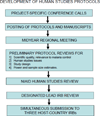Improving malaria control in West Africa: interruption of transmission as a paradigm shift
- PMID: 22142790
- PMCID: PMC3294075
- DOI: 10.1016/j.actatropica.2011.11.009
Improving malaria control in West Africa: interruption of transmission as a paradigm shift
Abstract
With the paradigm shift from the reduction of morbidity and mortality to the interruption of transmission, the focus of malaria control broadens from symptomatic infections in children ≤5 years of age to include asymptomatic infections in older children and adults. In addition, as control efforts intensify and the number of interventions increases, there will be decreases in prevalence, incidence and transmission with additional decreases in morbidity and mortality. Expected secondary consequences of these changes include upward shifts in the peak ages for infection (parasitemia) and disease, increases in the ages for acquisition of antiparasite humoral and cellular immune responses and increases in false-negative blood smears and rapid diagnostic tests. Strategies to monitor these changes must include: (1) studies of the entire population (that are not restricted to children ≤5 or ≤10 years of age), (2) study sites in both cities and rural areas (because of increasing urbanization across sub-Saharan Africa) and (3) innovative strategies for surveillance as the prevalence of infection decreases and the frequency of false-negative smears and rapid diagnostic tests increases.
Copyright © 2011 Elsevier B.V. All rights reserved.
Similar articles
-
Sahel, savana, riverine and urban malaria in West Africa: Similar control policies with different outcomes.Acta Trop. 2012 Mar;121(3):166-74. doi: 10.1016/j.actatropica.2011.11.005. Epub 2011 Nov 19. Acta Trop. 2012. PMID: 22119584 Free PMC article.
-
Challenges and prospects for malaria elimination in the Southern Africa region.Acta Trop. 2012 Mar;121(3):207-11. doi: 10.1016/j.actatropica.2011.06.019. Epub 2011 Aug 19. Acta Trop. 2012. PMID: 21871864 Free PMC article.
-
Malaria epidemiology and control in Southern Africa.Acta Trop. 2012 Mar;121(3):202-6. doi: 10.1016/j.actatropica.2011.06.012. Epub 2011 Jul 2. Acta Trop. 2012. PMID: 21756864 Free PMC article.
-
Epidemiology and infectivity of Plasmodium falciparum and Plasmodium vivax gametocytes in relation to malaria control and elimination.Clin Microbiol Rev. 2011 Apr;24(2):377-410. doi: 10.1128/CMR.00051-10. Clin Microbiol Rev. 2011. PMID: 21482730 Free PMC article. Review.
-
Folic acid supplementation and malaria susceptibility and severity among people taking antifolate antimalarial drugs in endemic areas.Cochrane Database Syst Rev. 2022 Feb 1;2(2022):CD014217. doi: 10.1002/14651858.CD014217. Cochrane Database Syst Rev. 2022. PMID: 36321557 Free PMC article.
Cited by
-
The relationship between Plasmodium infection, anaemia and nutritional status in asymptomatic children aged under five years living in stable transmission zones in Kinshasa, Democratic Republic of Congo.Malar J. 2015 Feb 18;14:83. doi: 10.1186/s12936-015-0595-5. Malar J. 2015. PMID: 25880427 Free PMC article.
-
Editorial commentary on: Malaria parasitaemia among long distance truck drivers in the Niger delta of Nigeria.Afr Health Sci. 2012 Jun;12(2):89. doi: 10.4314/ahs.v12i2.2. Afr Health Sci. 2012. PMID: 23056011 Free PMC article. No abstract available.
-
Declining malaria parasite prevalence and trends of asymptomatic parasitaemia in a seasonal transmission setting in North-Western Burkina Faso between 2000 and 2009-2012.Malar J. 2013 Jan 22;12:27. doi: 10.1186/1475-2875-12-27. Malar J. 2013. PMID: 23339523 Free PMC article.
-
Microscopic and molecular evidence of the presence of asymptomatic Plasmodium falciparum and Plasmodium vivax infections in an area with low, seasonal and unstable malaria transmission in Ethiopia.BMC Infect Dis. 2015 Aug 5;15:310. doi: 10.1186/s12879-015-1070-1. BMC Infect Dis. 2015. PMID: 26242405 Free PMC article.
-
Development of a data collection and management system in West Africa: challenges and sustainability.Infect Dis Poverty. 2018 Nov 16;7(1):125. doi: 10.1186/s40249-018-0494-4. Infect Dis Poverty. 2018. PMID: 30541626 Free PMC article.
References
-
- Ajuwon GA, Rhine L. The level of Internet access and ICT training for health professionals in sub-Saharan Africa. Health Info. Libr. J. 2008;25(3):174–185. - PubMed
Publication types
MeSH terms
Substances
Grants and funding
LinkOut - more resources
Full Text Sources




